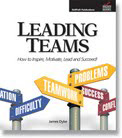The emotional impact of a leader is obviously subjective—it’s up to the individual “follower” to determine the value of a leader’s work. By that token, a leader may have an immense emotional impact even in spite of loss or failure.
Up Close and Personal
I remember standing in the middle of the Alamo, reflecting on the many heroes who fought, died, and ultimately were defeated there. In spite of that difficult reality, most Americans are inspired by the example of those who sacrificed their lives there.
The practical gauge of leadership, however, is arguably the measurable impact the leader produces in their external circumstances. In other words, what has happened or changed as a result of their leadership??
Taken one step further, we might also consider what Ken Blanchard described as “the important thing” about leadership:
The important thing about leadership is not what happens when the leader is present, but what happens when the leader is not there.
And even further, what happens when the leader has completely relegated the work to the followers and is no longer present? (Does anyone out there deny the dismal record of successful leadership succession among organizations today??? Do I even need to raise the question??)
By all these measures, there is certainly one particular leader historically who deserves our consideration. My intention is to do so…and to celebrate this holiday season by referring to my post from last year at this time. It also includes an appropriate greeting to all my readers. You can access it here:
Enjoy the post; enjoy this holiday season; and commit yourself to making the new year even better than the last!
Until next time… Yours for better leaders and better organizations,
Dr. Jim Dyke – “The Boss Doctor” ™ helping you to BE a better boss and to HAVE a better boss!


